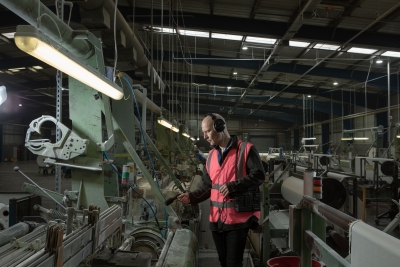
A Scottish technical textiles company, celebrating its 160th anniversary, is helping preserve the disappearing sound of the factory.
Scott and Fyfe are working with Siôn Parkinson of Song Work to capture and safeguard the sound of their factory machinery before it changes or disappears with the advance of technology. Siôn is also recording the stories of staff whose memories are intrinsically linked to these sounds.
Uploaded to the Song Work website, a sound library that Siôn founded in 2019, the machinery sounds recorded at Scott and Fyfe will be shared with the National Library of Scotland sound archive to preserve the sonic heritage of Scotland’s workplaces for future generations.
As the employee-owned company marks its 160th milestone, Michelle Quadrelli, Chief Executive, was eager to get involved in the project, commenting,
“Having started out as a linen works in 1864, we have been part of the Tayport community for 160 years and, in that time, a lot has changed. With the company now owned by our team of 90 staff, we are acutely aware of the value our people play. We wouldn’t be where we are without them - we owe it to them and to future generations to preserve their experiences and memories. Over the years, we’ve had entire families working here; their lives revolved around this factory, and we’d love to capture some of their stories and memories before they fade, many of which are sparked and motivated by the sounds they heard and still hear as part of their working day. As technology advances, the sounds change and factories will become quieter, so it’s important that we capture these times before they are gone.”
Dave Nicol, Engineer, is the fourth generation of his family to work at Scott and Fyfe. Approaching his 40th year with the company, he said,
“When we were in the old Scotscraig Works, there were 42 weaving machines, all close together, with a low roof. It was a noisy place, especially with all the Dundee weavers. I remember the sound of the looms. Sometimes, they would resonate, all going separately, but then, every now and then, they’d come together to form one single noise, and then they would separate again. That noise, when you’ve worked in it, it’s always in the back of your mind; you could feel the noise, the vibrations, it was intense.
Rod Swan, also a Machine Operator, who has worked for the company for 37 years, added,
“I remember the noise but, more so, the people trying to speak above the noise. People used to shout and roar. We sometimes have to tell the younger ones to speak up – you can see their lips move, but there’s no sound. They soon learn that they need to raise the level to be heard and to stay safe. For many women, that was the only environment they’d ever worked in. Even when they weren’t on the machinery, in the canteen, they were just as loud!”
Dave added,
“A lot of families worked here — fathers, mothers, sons and daughters. They almost had a separate language of their own for getting attention and calling people across the machines. Their voice had to be heard at a different pitch than the machinery. We still have a couple of people who do that, and they learnt it from the old weaver women - they make a ‘woo-hoo’ sound. It’s above the pitch of the machines when everyone turns to hear you, the whole shed. It’s not necessarily louder; it’s just a different pitch.”
In addition to his recent work with Scott and Fyfe, Siôn has also captured over workplace sounds across Dundee, from Dundee Contemporary Arts, Ninewells Hospital and Verdant Works to the former Michelin tyre factory, where his father worked, before the plant closed in 2018.
Siôn added,
“I was particularly interested in capturing the sounds of machines at Scott and Fyfe after hearing one was about to have its power removed and be decommissioned. It was a call to arms, realising the noises of this machine would be lost, never to return. The sound of the factory and the stories of the people who work there are important forms of sensory heritage. Sound makes a workplace what it is, provide the atmosphere workers experience, and can spark memories of days gone by. If we lose these historic sounds, we risk losing memories of a place and therefore a significant part of our culture.”
Scott and Fyfe provide high-performance solutions to countless industry challenges affecting sectors as diverse as agriculture, automotive and construction. From engineering fabrics that reinforce structures to sustainable materials that reduce environmental impact, Scott and Fyfe allows clients to grasp new opportunities by transforming conceptual ideas into commercial innovations.
For more information, visit https://scott-fyfe.com/ and https://songwork.org/
